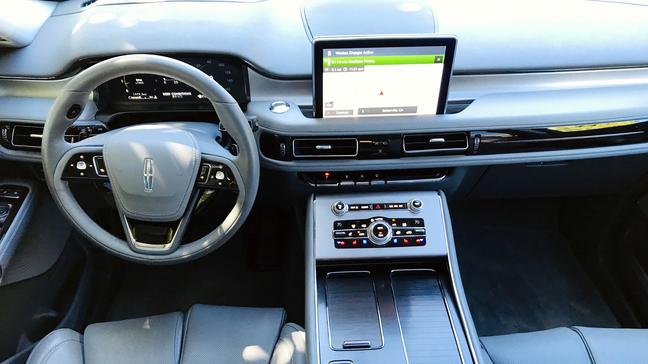5 things to know about the 2020 Lincoln Aviator
Lincoln is pumping up its lineup with a slew of new SUVs. The onslaught began in 2018 with the award-winning Navigator, then continued with the Nautilus. Now we have the three-row midsize Aviator making its entrance.
It is a study in quiet elegance and packed with some interesting, forward-looking technology.
Here’s a quick look at five of the most significant features on the new Aviator.
Safety is standard
The base Select trim comes with Lincoln’s Co-Pilot360 safety suite. So, in addition to your standard front, side and knee airbags, the Aviator has a lot of up-level technology that may avoid the use of said airbags.
Co-Pilot360 includes automatic high beams, automatic emergency braking, lane keep assist, driver alert, blind-spot monitoring, rear cross-traffic alert and a rearview camera.
If that’s not enough, the available Co-Pilot360 Plus (available at the Reserve trim in the Reserve I Package for $4,930) adds adaptive cruise control with speed sign recognition, a 360-degree camera, evasive steer assist, automatic reverse braking and Active Park Assist Plus.
Park Assist Plus allows the car to park itself
Ford Motor Co. and its sister Lincoln Motor Co. have been on the forefront of “self” parking technology. Initially, what that meant is if you were trying to parallel or perpendicular park, you could engage the system, it would verify if the vehicle would fit in the spot and then direct you to take your hands off the steering wheel. You would still have to control the braking function, but the car would steer itself into the spot.
Now, with Park Assist Plus, you can also take your foot off the brake and let the vehicle do all the heavy lifting. The system works well, and often manages to wedge the vehicle into a spot smaller than what I would have attempted on my own.
Another function of the Park Assist Plus is that when engaged, it can also pull you out of a spot – either to the right or left – just by tapping the turn signal indicator.
It has an available plug-in hybrid powertrain
Aviator is powered by 3.0-liter twin-turbo V-6 engine, and the plug-in hybrid version adds a 13.6 kWh battery pack that enables between 18 and 25 miles of EV-only range depending on vehicle and temperature conditions.
It also adds a nice power boost, adding 94 horsepower and a whopping 215 pound-feet of torque for a combined power output of 494 and 630, respectively.
The PHEVs are only available as all-wheel-drive models in the Grand Touring ($70,540) and Grand Touring Black Label ($89,540) trims.
It be charged 100 percent in 3 to 4 hours with a Level 2 charger or 240-volt power jack, or it can get up to 75 percent of its charge returned while driving in EV Conserve mode.
When not expressly in EV Mode, the Aviator PHEV operates like a straight hybrid using both engine and motor to motivate the wheels.
The available adaptive suspension helps mitigate potholes
The Dynamic Handling Package ($3,000) is available on the Reserve trim, but it requires the Reserve II Package ($11,625) before you can add it. It includes Lincoln’s advanced adaptive suspension, which uses 12 sensors to monitor motion, steering, acceleration and braking. Then it will automatically adjust to mitigate harsh road surfaces.
Included in this package is something called “Road Preview,” which uses the forward-facing camera to preview the road about 50 feet ahead to look for height deviations between 2 and 8 inches, then mitigates impact.
Another nifty feature enabled by this advanced system is the “Air Glide Suspension,” which enables preset ride heights as well as the ability to automatically lower when it senses the driver approaching the vehicle with the key fob to make ingress easier.
You can use your phone as a key
The coolest bit of tech on the new Aviator, IMHO, has to be the ability to use your phone as a key. This is the first vehicle in the Lincoln lineup that gets this feature.
Called “Phone as Key,” this feature allows you to ditch your key fob, and using the Bluetooth technology on your phone, you can unlock and start your vehicle just by having your phone in your pocket.
You set this up via the Lincoln Way app, enabling up to four devices to be used as a key.
In terms of security, the paired phone must be within a couple feet to unlock the door, and it must be within the Aviator itself to start the vehicle.
Plus, there are fail-safe codes that allow access to the vehicle and the ignition assuming your phone is lost, stolen or out of juice. You can also easily delete a phone as key, assuming the phone falls into the wrong hands.
The Bottom Line:
Other than the Navigator, I don’t see a lot of Lincolns on the road these days. But I have a feeling that’s about to change with Lincoln’s new product line.
The 2020 Lincoln Aviator packs a one-two punch with its cool tech features and smooth ride and handling. If you are looking at the Audi Q7 and Volvo XC90, the new Aviator should also be on your must-test list.
If you want more information about the all-new Aviator, be sure to check out our first-look review.



